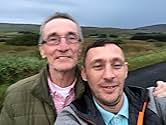"So what are we then? Nothing? How are we Irish if we have British passports?"
This bewildering question, posed by a protagonist in The Flats, encapsulates the film's perplexing grasp of identity in post-Good Friday Agreement Northern Ireland. The fact that it was uttered left me stunned-how could anyone from the sregion misunderstand their own dual-national rights so profoundly? Directed by Alessandra Celesia, a filmmaker who is notably not Irish, the film's outsider perspective only amplifies its detachment from the community it claims to portray.
Despite its title, The Flats barely shows the housing estate it's supposedly about. Instead, the screen is filled with characters lost in nostalgia-some reenacting hunger strikes stripped of historical context, others performing as if chasing stardom. The question looms: Who was this film made for, and why? The narrative feels unmoored, pushing an agenda that bears little resemblance to the lived experience of those it portrays.
The film flirts with highlighting the region's educational struggles, which might have been compelling if intentional. Instead, it becomes a hollow echo of a past long gone, with Joel McNally's self-destructive hunger strike serving as the centrepiece of this futility. He insists on defying medical intervention, but the state reminds him: in unconsciousness, resistance is impossible. His rebellion, much like the film, feels directionless-a shout into a world that has moved on.















